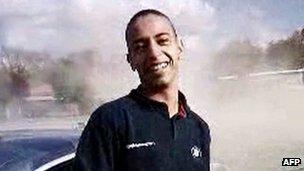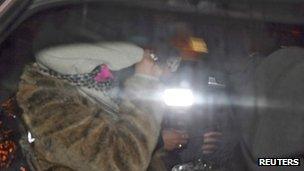Did France ignore the Islamic radical threat?
- Published

The killings apparently committed by Mohamed Merah are expected to spark intense soul-searching
According to Marine Le Pen, feisty head of the National Front, the Toulouse killings are evidence that France has "dangerously underestimated the threat of Islamic fundamentalism".
Is that fair?
As a criticism, it cannot be dismissed out-of-hand just because she is on the far right. Seven people have been murdered in horrific circumstances, and the killer found his justification in Islam.
While the identity of the killer was unknown, the preferred theory of the chattering classes was quite clearly that he should be a neo-Nazi.
Some even blamed President Sarkozy for inflaming anti-minority passions and creating the conditions where the attacks were possible.
Such insinuations seem utterly tasteless today, and will quite possibly set off a backlash against those who made them.
But that still doesn't answer the original question. Has France taken its eye off the Islamist ball? And more specifically: With better intelligence, should France not have stopped Mohamed Merah before hispassage à l'acte?
It is true that 23-year-old Mohamed Merah had for some years been in the sights of the DCRI (France's domestic intelligence).
Lone wolf
After growing up inLes Izards,the high-rise estate of Toulouse, he turned to petty delinquency in his late teens.
Then two or three years ago he got religion.
According to the prosecutor in the case, Francois Molins, he underwent a process of "atypical Salafist self-radicalisation".
For young delinquents, of Muslim background in the Frenchbanlieues(suburbs), to feel the call of Islam is not in itself unusual. What is different in Merah's case is that he appears to have enjoyed acting independently.
He made two trips to Afghanistan and Pakistan in November 2010 and August 2011.
But according to the French authorities, he made them under his own steam - not therefore relying on the established Islamist networks, which are of course closely monitored by the intelligence agencies.
Nonetheless, Mohamed Merah had been identified as a man to watch. On his return from Pakistan last year, he was even called in for questioning by French intelligence agents.
And when police began combing through computer IP addresses linked to the first victim, it was the appearance of Merah's mother's name on one of the accounts that gave them their first big lead.
It is certainly a matter of huge regret that the link with Merah was not established before the killings at the Jewish school on Monday.
Had the relevant IP account (one of 575 they were checking) been higher up the police list, conceivably they could have saved four lives.
But that is surely just the hazard of high-pressure police work. No-one has seriously questioned the competence or diligence of the investigation.
Personality of a killer
A more serious question is whether the intelligence services should not have been monitoring Merah much more closely.
A lot of French people will have assumed that if a known radical returns from the Afghan-Pakistani al-Qaeda-ruled badlands, then he will be more or less permanently tailed by the secret service.
But this did not happen. In fact Merah was able to stockpile a huge amount of weaponry, and even when they identified him as a suspect, the DCRI still had no idea of his whereabouts.

The first police lead to Mohamed Merah came through his mother's computer
Interior Minister Claude Gueant's answer to this is that "it is impossible to arrest someone just because he has Salafist views. In France - and this is a good thing - holding a particular point of view is not a crime."
In other words intelligence agents had no particular reason to suspect that Merah's religious extremism would turn to violence.
This is where the personality of the killer comes in.
By all accounts he acted if not alone, then within a very small group, with help mainly from his brother Abdelkader.
He had, some commentators have said, a "psychopathic" ability to compartmentalise his behaviour. People who knew him, such as his lawyer and the France 24 journalist whom he telephoned late on Tuesday night, described him as polite, courteous and civilised.
No suicide bomber
And yet he was also a man capable of grabbing an eight-year-old girl by the hair and shooting her dead. In other words he was at a crossroads between religious extremism and morbid mental disorder.
According to newspaper reports, on his recent return from Pakistan, he tried to indoctrinate Muslim youngsters in his neighbourhood by showing them snuff videos of men being decapitated, and other horrors.
But Merah was at a crossroads in other senses too. Between the worlds of criminality and religion, for example.
The guns came from somewhere - presumably the drugs gangs of thebanlieueswill have helped. And culturally at a crossroads too.
What is perhaps most interesting is the thing that he was not - he was not a suicide-bomber. In other western societies, notably Britain and the US, jihadists have shown themselves willing to act out the role perfected in Iraq or Afghanistan, and blow themselves up.
Merah said he did not have the "soul of a martyr", according to Interior Minister Claude Gueant. His manner of leaving this life was more in the style of a cheap action movie than a religious ecstasy.
So perhaps the lesson is that France needs to be more aware of the different faces that violent Islamic extremism can assume.
It is not fair to say that France has taken the eye off the jihadis. The fact is that this is the first act of Islamic terrorism in France since the mid 1990s, for nearly 20 years.
The intelligence services have done their work.
But as the IRA used to say in Northern Ireland: You have to get it right all the time. We only have to get it right once.